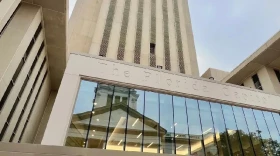The Centers for the Arts Bonita Springs is taking on a youth theater production of Thorton Wilder’s enduring drama, “Our Town,” at the end of July.
Theater scholars and reviewers alike regard “Our Town” as an American classic and many even believe it to be the greatest American play ever written. The story’s timeless character is one reason that Director Kody C. Jones is eager to bring the drama to the stage.
“The first time I read the show I was 17 or 18 years old… and every time I’ve read it since then… I feel a different attachment to it based on what’s going on in the world and that’s what leads me to believe that what makes this play so valuable or so great is that it’s passed through the ages and you can connect to it in multiple, multiple different ways,” said Jones.
“Everybody, I think anyone can connect to it in multiple different ways in any time period just depending on what’s going on.”

“Our Town” takes place in the small fictional New Hampshire town of Grover’s Corners, where everybody knows not only their neighbors’ names, but what makes them tick.
However, you don’t have to come from a small community to connect with the good people of Grover’s Corners. As actor and narrator Kenan Allen observes, whether urban or suburban, there’s something for everyone in this show regardless of race, color or creed.
“You don’t have to be from a small town, nor do you have to be white, nor do you have to be Black nor do you have to be Hispanic or Asian or Pacific Islander,” said Allen. “You just have to be ready to go into the world and look outside yourself.”
As a 23-year-old student at the American Academy in Rome, Wilder became convinced that people from different ages and places are really not all that different. The seminal moment for this realization came while he was visiting an archeological dig site of a first-century tomb. After the experience, he wrote his parents that as street cars rushed above them, they peered by candle-light paintings and other symbolic representations of the parents and children of a family named Aurelius. “We were clutching at the past to recover the loves and pieties and habits of the Aurelius family, while the same elements were passing above us,” wrote Wilder.
“That realization, his idea that human lives across centuries are universally conjoined by certain personal moments and milestone events, became a foundation of ‘Our Town,’” writes Bud Kliment for The Pulitzer Prizes in an article titled “The birth and life an American classic: ‘Our Town.’”
Actor Danica Murray, who plays the matriarch of one of two families featured in the play, finds this to be the key to the play’s relatability.
“It’s really wonderful because it’s so slice-of-life,” Murray said.
“It’s not about this grand spectacle, but it’s really just about those everyday things and what makes them so special. Like, why is it so important when we wake up every morning and have breakfast or why, when we speak to our neighbors, what’s so touching and important about that? So, it hits close to home for everybody because everybody has experienced ‘Our Town’ and so it’s really, really beautiful in that way.”
FGCU theater major Tatum Bates, who plays the matriarch of Grover’s Corners other featured family, thinks that every parent in the audience will relate to the show’s alive moments.
“It’s something that not even every mother, but every parent as well can look at in the audience and think about how important those little tiny moments are even if you’re just talking about school and preparing dinner,” Bates points out. “How important that is and how key those moments are when you’re remembering and reflecting on everything at the end of the day.”
Wilder employed a number of unconventional theatrical devices to enhance the audience’s ability to connect with the characters on stage. The first was his use of a narrator, who not only talks directly to the audience, but brings in guest lecturers, fields questions and fills in playing some of the roles.
Kenan Allen observes that his character is not only a gateway into the world of “Our Town,” but serves as a conduit to help audiences better appreciate each character’s little moments in life.
“The stage manager has a lot of moments where he’s just sitting and observing, so I like to let people know that I’m there with you. I’m seeing everything they’re doing with you. I’m feeling it just as much as you are,” said Allen.
“He’s just so happy to see these people live their normal, everyday lives. So, when people ask me ‘What’s “Our Town” about?’ I say it’s a simple show about appreciating the little things in life and I think that’s what the stage manager does when he's watching everyone just live their lives. He’s appreciating their little moments in life even if they’re not.”
Wilder also keeps the audience’s attention focused squarely on the characters through the use of an exceedingly minimalistic set, which includes just a table, a few chairs and two steepled wooden ladders.

“It’s a very skeletal set,” said Jones. “Everything is hollow. The ladders are hollow. The table’s hollow. The chairs are hollow, but I think the audience is meant to fill them up with their memories, their thoughts, right, their ideas. Whatever they’re connecting to. And that leaves an open palette for the audience to paint with.”
Jones likes to put his own spin on every project he tackles. For “Our Town,” he’s introduced empty picture frames.
“I chose the frames because they’re skeletal. They’re open. You can fill in that frame with a family member. You can fill in that frame with someone you lost. You can fill in that frame with someone you know right now,” said Jones.
“That gives another opportunity for the audience to really paint themselves and their own stories and history into the works of our production of ‘Our Town.’”
While the first two acts of the play may evoke parallels to The Waltons, Little House on the Prairie and The Andy Griffith Show, audiences are in for the shock of their lives in the third act, which injects an unexpected surrealist twist.
“It’s told in a very different way, which makes you not only super focused on what’s happening, but it makes you connect even deeper through symbolism and not realism,” Jones reveals. “The realism welcomes the audience in. It makes you comfortable, makes you familiar. And then Act Three happens and turns everything on its head.”
After “Our Town” closed on Broadway, it was licensed for amateur production. Over the ensuing 20 months, it was produced in 658 communities across the United States and Canada, and remains today one of the most performed plays anywhere in the world.
Like all the other audiences who’ve seen “Our Town” over the eight decades that have transpired since the drama premiered in Princeton, New Jersey, those who come to the Centers for the Arts Bonita Springs’ youth theater production of the show will similarly marvel at Thornton Wilder’s lyrical portrait of young love and his plain-spoken philosophical observations about living, dying and all those poignant moments in between.

If You Go:
All performances take place in the Center for Performing Arts’ Hinman Auditorium at 10150 Bonita Beach Road, Bonita Springs.
Performance Schedule:
Friday, July 29 at 7 p.m.
Saturday, July 30 at 2 p.m. and 7 p.m.
Sunday, July 31 at 2 p.m.
To read more stories about the arts in Southwest Florida visit Tom Hall's website: SWFL Art in the News.
Spotlight on the Arts for WGCU is funded in part by Naomi Bloom, Jay & Toshiko Tompkins, and Julie & Phil Wade.
WGCU is your trusted source for news and information in Southwest Florida. We are a nonprofit public service, and your support is more critical than ever. Keep public media strong and donate now. Thank you.







